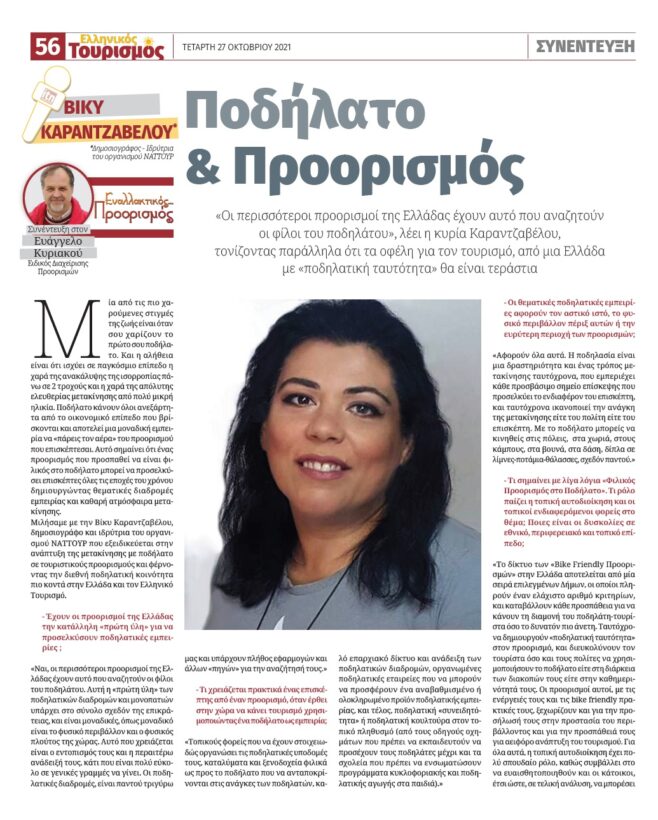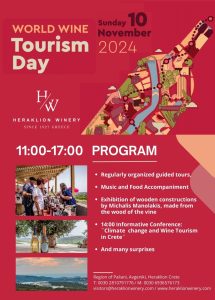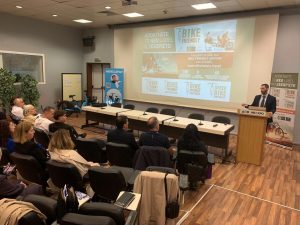Bicycle & Destination: Interview with Vicky Karantzavelou by Evangelos Kyriakou and the newspaper Greek Tourism

Folder: Bicycle & Destination
One of the happiest moments in life is when you receive your first bicycle. The truth is that the joy of discovering balance on two wheels and the freedom of movement from a very young age is universally shared. Cycling is for everyone, regardless of their economic status, and it offers a unique experience of “taking in the atmosphere” of the destination you visit. This means that a destination that strives to be bicycle-friendly can attract visitors year-round by creating thematic experience routes and offering a clean environment for transportation.
We spoke with Vicky Karantzavelou, a journalist and founder of the NATTOUR organization, which specializes in promoting cycling mobility in tourist destinations and bringing the international cycling community closer to Greece and Greek tourism.
Do Greece’s destinations have the necessary “raw material” to attract cycling experiences?
Yes, most of Greece’s destinations have what cycling enthusiasts are looking for. The “raw material” of cycling routes and trails exists almost throughout the country, and they are unique, just as Greece’s natural environment and wealth are unique. What is needed is their identification and further promotion, which is generally very easy to achieve. The cycling routes are all around us, and there are many applications and other “sources” to find them.
What does a visitor practically need from a destination when they come to the country to engage in tourism using a bicycle as part of their experience?
Local authorities should have at least some basic cycling infrastructure organized, accommodations and hotels that are bike-friendly and meet the needs of cyclists, a good rural road network, promotion of cycling routes, organized cycling companies that can offer an upgraded or complete cycling experience, and finally, cycling awareness or a cycling culture among the local population (from vehicle drivers who must be trained to be mindful of cyclists to schools that should incorporate traffic and cycling education programs for children).
Do thematic cycling experiences concern urban areas, the natural environment around them, or the wider destination region?
They involve all of these. Cycling is both an activity and a mode of transportation that encompasses every accessible point of interest that attracts visitors’ attention, while also fulfilling the need for transportation for both citizens and visitors. With a bicycle, you can move through cities, villages, plains, mountains, forests, next to lakes, rivers, and seas—virtually anywhere.
In brief, what does “Bike-Friendly Destination” mean? What role do local governments and local stakeholders play in this issue? What are the challenges at the national, regional, and local levels?
The “Bike Friendly Destinations” network in Greece consists of a series of selected municipalities that meet a minimum set of criteria and make every effort to ensure the cyclist-tourist’s stay is as comfortable as possible. At the same time, they create a “cycling identity” for the destination and make it easier for both tourists and citizens to use bicycles, whether during their holidays or in their daily lives. These destinations, through their actions and bike-friendly practices, stand out for their dedication to environmental protection and their efforts toward sustainable tourism development. Local governments play a very important role in all of this, as they contribute to raising awareness among residents so that, ultimately, “soft mobility” with bicycles can be integrated into the urban fabric. The main challenges in this effort lie in integrating the bicycle into the philosophy of Greek drivers and citizens. There are well-known, long-standing obstacles that are not only social but also related to the legislative framework.
How feasible is it for a business or organization to become bike-friendly for cycling visitors? What steps should they take to engage with this issue?
For a business or organization to become bike-friendly, no difficult or unfeasible actions are required. It is an easy and creative process. It only takes the will and commitment from the business or organization to meet the criteria for “bike-friendly” certification. The necessary steps include raising awareness and recognizing the need for “soft mobility” for tourists and citizens, followed by the desire for minor adjustments and organizing basic cycling services and infrastructure, which often do not require expensive investments but collaboration with those specializing in cycling (cycling companies, shops, etc.). Finally, communication with NATTOUR is needed to take the appropriate steps to gather the necessary documentation and meet the requirements for Bike Friendly certification.
What are the benefits of a recognizable Greece as a cycling tourism country? Can this happen if destinations and stakeholders do not take networking actions for more complete experiences?
The benefits of a “cycling identity” for Greek tourism are immense. This is evident from similar examples abroad, particularly in some European countries that have been developing cycling tourism for years. However, to reach this second or third stage of cycling tourism development in Greece—where the entire country develops this cycling identity—we first need to lay the right cycling “foundations” by locally developing cycling tourism and infrastructure. Clearly, at this stage, we are far from a general “recognition” of Greece as a cycling destination. At this moment, we must first shape the product called “cycling and tourism.” Finally, it is very important to mention that cycling is essentially a form of “soft mobility” that is not self-sufficient in terms of cycling activities alone but can connect all thematic forms of tourism. Cycling tourism is not limited to a standalone thematic form of tourism but encompasses the opportunities and prospects that cycling itself offers, allowing citizens and visitors to enjoy a range of activities and local points of interest.
Source: ITN News



